Friday, July 28, 2006
Bien Cuidado Seño' ?
The day before yesterday V dropped her mobile on the rough land behind our house in Antigua. During the afternoon I called and someone answered (it sounded like a young woman) but made out that she couldn't hear me. Later in the day V realised her phone was missing and went back to where she walked the dog in the morning...and found her phone!
Guatemala is vying with Venezuela to take-over Argentina's permanent seat on the UN Security Council. With heavy backing from the US, President Oscar Berger reckons he is closing in on the required votes tally. "We have 98 countries backing us, I'm not going to mention names," he added. "A vote for Guatemala is seen as a vote for the Bush administration, and globally that's not very popular these days," observes Michael Shifter, an analyst at the Inter-American Dialogue, a Washington-based think tank. Meanwhile, Hugo Chavez has been building up his airmiles on a tour to promote Venezuela's candidacy.
Guatemala's Public Hospitals ended their 48-day partial strike yesterday after the Health Ministry agreed to increase the health sector budget from the current $276 million up to $410 million in 2007. Guatemala devotes just 0.9 percent of GDP to health services, the lowest in the region.
Wednesday, July 26, 2006
Sacando el jugo
Dude...
 ...this place sucks. " (Unfortunate how the video captures the 'LT' (Lieutenant) legging it as fast as he can away from the rest of his unit. )
...this place sucks. " (Unfortunate how the video captures the 'LT' (Lieutenant) legging it as fast as he can away from the rest of his unit. )I was treated to a far more dignified and heroic view of American soldiers in Iraq last night when I watched Tom Roberts' excellent documentary A Company of Soldiers which followed the men of Dog Company of the 1st Batallion, 8th Cavalry Regiment around the time of the Falluja offensive in 2004. There are some extraordinarily touching moments, such as the memorial service for a Humvee gunner mortally wounded in an ambush who still clambered back to his turret to take out the insurgents threatening the vehicle. The emotional and pyschological stress these guys face up to every day is almost unimaginable.
There was one clear example of questionable conduct when the company doctor (of all people) gratuitously shot an Iraqi man's dog. Yet the way the Humvee patrols move along the highways using gunfire into the air to keep other vehicles at a safe distance is unlikely to endear them to the locals.
When originally shown across the pond the film fostered a starkly polarised online debate about whether it was it a celebration of the military's comradeship and heroism or whether it demonstrated conclusively that the troops should come home. Both in my view.
The New York Times headline on Monday was 'US speeds up bomb delivery to Israel.'
No doubt they sped past Secretary Rice on her way to the region.
Monday, July 24, 2006
What good are the arts?
 "It would be impossible to prove that a Picasso was any more 'true' than, say, a washing machine or a packet of crisps."
"It would be impossible to prove that a Picasso was any more 'true' than, say, a washing machine or a packet of crisps."There's a Dawkins-like certainty about Professor Carey's argument in this provocative (and very entertaining) set of related essays. He seems so absolutely sure that his logic is safe against all reasonable challengers that only the religiously-inclined and other incurable irrationalists need bother wasting their time. For this reason alone, it's probably worth having a bit of a poke at it. Here then are the key messages:
- Art is not an inherently valuable category
- Art is not improving or virtuous, or at least not any more so than high street fashion, gardening or football
- In spite of the persistent notion that exposure to high Art will humanise the masses, the 'cult' of Art has actually tended to work against social cohesion
- We cannot call other people's aesthetic choices incorrect, at least not rationally. Art is a matter of subjective opinion not knowledge (and science has not been able to help us cross this divide)
- The moment the last human being on Earth dies, the Mona Lisa, the Taj Mahal and all other 'great' art would become inherently valueless. While for some this conclusion is self-evident, Carey notes that many still find it strangely hard to accept
- "The abyss of relativism is where we have always been - if it is an abyss."
Here in the modern West, Carey argues, the esteem that high culture is held in"casts the majority of people in drab and secondary role of monument visitors" and that for the self-selected minority, personal gratification via the supposedly transcendent value of Art encourages "contempt for the merely human, the passive, the contingent, finite world".
Recall, he asks us, how the Nazis forced Jews to play string quartets before executing them, and how Hitler at first welcomed the allied bombings as a way of prepping Berlin for the roll-out of his grand designs. "There is little point in acquiring two Rembrandts and a Rubens if your social views remain indistinguishable from those of any saloon-bar fascist," he notes somewhat sourly.
I'm not entirely unsympathetic to this anti-elitist campaign against the snooty aristocrats of High Art. In recent months whilst I may have read many of what I consider to be high quality books, none of them, nor any of the top notch movies I've seen over the same period, felt as subjectively improving as the experience of watching LOST, surely an example of popular rather than high art in most people's estimation. Indeed, this convoluted serial has had for me the opposite effect of reading Michel Houellebecq − I can feel myself sweating out the misanthropic gunk in my pores every time I watch it!
It's clear too that when you describe something as "funny" (another category featuring a rather loose consensus) you are not at the same time implicitly asserting your own social status in quite the way you do when you comment on the higher artistic significance of something. There's no question that Western aesthetics are infused with self-esteem − yet surely they are not entirely invalidated by this?
Does Carey mean to say that the comparatively nebulous category of Art is the problem here, or that all assessments of comparative value are inherently relative? The statement "the act of valuing confers value" in the epilogue suggests the latter. Earlier on he also asserts that "moral questions are those to which no answers are available".
I'm pretty sure he doesn't mean to say that no attempt should be made to find answers to moral questions or that any answer is as good as another, but these conclusions are nevertheless inferred by his relativist drift. Rejecting all gradations between good and bad, stupidity and genius seems rather a high price to pay for taking a few cheap shots at the intellectual snobs!
Along the way he does also seem to be making his own comparative judgments − such as the archetypally uncontroversial one that positions the Third Reich at the bottom of the pile of admirable social models. This is an example of a value judgment around which there is a basic consensus in 2006 (if not in Berlin in 1936). Yet talk instead in similar terms about Saudi Arabia and the consensus will be less obvious. It's relative, but it's still part of a clearly graded index. That we don't publicly torture and execute petty criminals in the West today is not a subjective difference of opinion between the present and the past, it's progress!
Carey's line of reasoning would seem to invalidate the scores given to Olympic figure skaters. Artistic impression...utterly subjective ? If Karlheinz Stockhausen believes 9-11 was a work of art, then anything goes surely? Yet in spite of some notorious moments of controversy across the Olympic cycles, quality generally rises to the top as a result of scoring by a panel of experts. Whilst I do accept that it might be easier to define the expertise of someone specialising in skating (or plumbing) rather than than Art, it does not follow that there is no such thing as artistic expertise.
My own way of facing up to the logical challenge posed by relativism is a form of dualism-lite, which requires less of a leap of faith than either Plato's ideas (a multiplicity of possible forms in suspension) or Kant's supra-sensible realm where things in themeselves hang out; essentially reality's VIP lounge. It seems to me that Einstein's general relativity might just offer an alternative 'solution' to relativism: inside spacetime matter is clearly ruled by time and chance, but whilst there may be no fixed Truth outside of this structure in its own separate cosmos, it could instead be an immanent part of our contingent reality − its other complete, organic nature, unreal in the sense that it cannot ever by fully comprehended from a relative perspective. (This is where I earlier promised to repeat that quotation from David Mitchell's Ghostwritten: "If you're in your life, chance. Viewed from the outside , like a book you're reading, it's fate all the way." )
With no absolute values sittingly haughtily up on higher planes of reference, this non-committal way of looking at things would seem to require a smaller leap of faith, and is not incompatible with Richard Rorty's more pragmatic brand of relativism in which Truth is a work in progress − which means that from the limited perspective of a contingent observer, it is still possible for something to be better (and perhaps a Picasso truer than a packet of crisps?)
Indeed, the last half of this book is devoted to making a case for why literature is itself better than the other arts:
- It values unpretentious people
- It (uniquely) can criticise itself
- The other arts are "locked in inarticulacy, incapable of reasoning." (Conceptual art for example, is incapable of the clarity that argument requires.)
- Literature is often indistinct, such that it inherently cultivates and enfranchises readers' own private imaginations.
And for Carey, that there can be no false answers in Art becomes in the end grounds for a positive take on its relative value in our lives, as it bears inherently unstable meanings that will take shape differently in the mind of each recipient:
"Poetic ideas do not tell you what the truth is, they make you feel what
it would be like to know it."
Friday, July 21, 2006
Loons
 I met up with Frode and Emily last night as they gathered ingredients at the Loon Foon and the Loon Moon in Gerrard Street in preparation for the inaugural visit of Emily's mother.
I met up with Frode and Emily last night as they gathered ingredients at the Loon Foon and the Loon Moon in Gerrard Street in preparation for the inaugural visit of Emily's mother. We also visited the New Harvest Fish Market on Shaftesbury Avenue. Dinner was fished out of a tank containing about thirty carp with the aid of a net of the sort kids use on tidal beaches. After about 30 seconds of mass evasive action the unlucky individual destined for la suegra's plate was secured and weighed within a flooded plastic bag: £13.30.
It was then carried off to the area behind the tank, which was kitted out like a pyscho's cellar with an assortment of different shaped knives and a pair of elbow length blue rubber gloves. I'm squeamishly western when it comes to animal executions, but I'd still have to say that the performance than ensued was disappointingly amateurish. The first blow delivered by the Chinese chopper appeared to miss the fish's head and the second launched it off the wooden block and into the air from where it bounced off the tiled wall and fell back into the sink. Dead or not it was promptly gutted and delivered to Frode in another see-through plastic bag. Emily didn't like the way its mouth kept on pouting open. It's not breathing, it's expiring I suggested.
Back home my own wokked-up evening meal consisted of strips of turkey breast cooked with mixed peppers, ginger, Thai green chillies, lemongrass (50+ cm stalks bought at Loon Foon) and doused at the end with a cup-full of Tom Kha coconut soup.
I had one of the best Thai stir-fry curries I have ever tasted a couple of weeks ago at the Panzón Verde. It's the one dish on Christophe's menu that is neither Swiss nor Guatemalan in inspiration and arrives on the table in a mini-wok heated from below by its own little oil-burner. V's only quibble was that the rice should have been kept separate as she felt it would tend to overcook this way. Great presentation though, and alive with flavour.
Thursday, July 20, 2006
The current Middle-East Crisis...
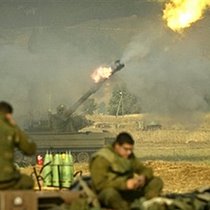 Reveals the sorry state of 24-hour news reporting in this country. I've had to turn over to Euronews to actually see for myself what's happening. On Sky News and BBC News 24 you are instead treated to a steady stream of experts opinionating and vying to deliver the most authentic-sounding pronunciation of Hizbollah. Viewers of these channels are thus denied any 'direct' experience of events, but are instead advised to synthesise an opinion from what is effectively a distributed panel debate.
Reveals the sorry state of 24-hour news reporting in this country. I've had to turn over to Euronews to actually see for myself what's happening. On Sky News and BBC News 24 you are instead treated to a steady stream of experts opinionating and vying to deliver the most authentic-sounding pronunciation of Hizbollah. Viewers of these channels are thus denied any 'direct' experience of events, but are instead advised to synthesise an opinion from what is effectively a distributed panel debate.And suddenly the most visible aspect of the whole story is the rather lame spectacle of dual-nationality Lebanese citizens hopping to safety on a Royal Navy destroyer − very reminiscent of the way worldwide attention immediately after the Rwandan genocide happily switched to the 'good-news' story of the international relief effort in the Congolese refugee camps (even though the beneficiaries of this were in many cases Hutu genocidaires.)
Once again uable/unwilling to intervene to stop the bloodshed at source, the international community is managing its self-image by showing us footage of its armed forces 'rescuing' people with the relevant paperwork. NYT: "Marines return to Beirut to aid US evacuation..."
Goal!
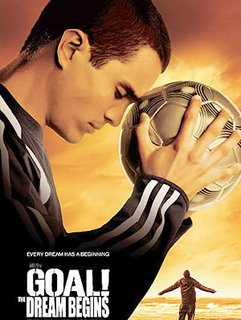 Just before I left Antigua V's nephew Marco Vinicio informed me that he had enjoyed this flick about a young Mexican wetback that makes it big in the Toon, so I made a mental note to give it a go (though expecting shite on a par with Wimbledon.)
Just before I left Antigua V's nephew Marco Vinicio informed me that he had enjoyed this flick about a young Mexican wetback that makes it big in the Toon, so I made a mental note to give it a go (though expecting shite on a par with Wimbledon.)There has been an almost total lack of even passably watchable soccer movies, but now we have this one, which is actually (just) better than mediocre. It's a two hour Adidas ad structured around an utterly formulaic fairy-tale, but the high-calibre writing from Dick Clement and Ian La Frenais (the team behind classic sitcoms The Likely Lads and Auf Wiedersehen Pet) overcomes this limitation, adding heart and comedy to the otherwise predictable sequence of episodes. Perhaps the funniest moment in the film − who knows if it was intentional or not − is David Beckham's cameo.
There are one or two other false notes, such as the bar full of Geordies in full costume watching live Premiership football in LA (7 am surely..?) and most of the actual match action is disappointing. Yet the main performances are strong, especially from Yale-educated yank Alessandro Nivola as the Toon's dissolute star-signing Gavin Harris and Marcel Iures (Slavo in Layer Cake), who is so convincing as Newcastle's foreign coach you are left with the impression that you've seen him before scowling from a Premiership dug-out. (Niovola is actually a keen sarker-player and represented the 'Rest of the World' in a charity match against England.) Sven-Goran Eriksson, Alan Shearer, Raul and ZZ also appear as themselves. These performances are not so strong...though Zhidane's heading skills might have been used to greater effect in the nightclub scene!
Underlying Santiago's personal story there's a social theme: aspiración: his father believes that the world is divided into mansion-owners and their lawn cutters and there's no point in resisting this state of affairs. The third part of the Goal! trilogy has just been shot during this summer's World Cup in Germany, where you might say that the dream − for most of the lawn cutters at least − ended in relative disappointment. Out in Guatemala I had a strong sense that this Mundial was supposed to be the showcase for Latin America's superior ball skills − typically honed on arid urban terrain − and the dodgy, defensive Italians running away with the copa was not part of the script.
Onc critic has speculated whether Santiago will play for Los Tri or his adopted homeland in the World Cup to be featured in Goal 3. Well, which one has an Adidas strip? Answer: Mexico (US is Nike.) Santiago might have adopted the land of the free, but the film gave us no indication that it had in turn adopted him. As an indocumentado, whilst entitled to join the Marine Corps and die in Iraq, the lack of a green card would surely prevent him being capped by the USA.
Monday, July 17, 2006
Jarhead
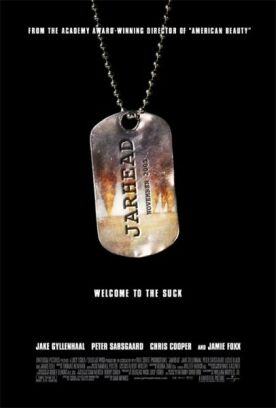 Welcome to the suck indeed.
Welcome to the suck indeed.Swofford's first rate account of time spent in the US Marine Corps scraping the surface of modern war had plenty of things going for it, yet hardly any have been translated onto the silver screen by director Sam Mendes. Such as...
The contrast between Assistant Professor of English Anthony Swofford and his unsophisticated ooh-rah self.
The anger and the irreverence of the author who, as I suggested in my post back in June 2004, has never really come down from his Gulf War I adrenaline rush.
His appreciation that he was at all times a soldier "for the vast fortunes of others" and that none of the rewards of victory would come his way. His account of the sound of rich Arabs passing near their positions, "Mercedes diesel engines racing through the night, their sound like some muffled cosmic laughter." The story of Saudi soldiers that went into town to find Korean and Filipino labourers to dig their defensive emplacements for them. "We don't dig."
His painful admission that he needed the Corps to save him from the "other life I'd fail at", to belong to a group, because no other would accept him.
In this movie Swofford is really no more articulate an observer-commentator than Charlie Sheen in Platoon. With the voice-over used to poor effect, gone are his funniest and most literate observations:
"His eyes looked dead, as though he'd lost them for a few years and found them washed up on a beach."
"He looked like the son of septuagenarians, as though he'd been on a shelf for many years before being born."
"We laugh to obscure the tragedy of our cheap, squandered lives."
I said in my original post that Swofford's ambivalence is near heroic. Here it's simply rather dull and formulaic. No amount of elegant images, interesting textures and period pop tracks are going to make up for this.
Missable. Read the book.
Saturday...mere wet stuff?
 By general consent McEwan is currently the best British novelist we have, and this very-enjoyable book nevertheless encapsulates why I tend to feel a sense of lurking dismay at this state of affairs. In style and sensibility McEwan has all the necessary traits of a great man of letters, yet when it comes to plot and character, he seems to have the skills of a lower-tier Hollywood scriptwriter. What gives?
By general consent McEwan is currently the best British novelist we have, and this very-enjoyable book nevertheless encapsulates why I tend to feel a sense of lurking dismay at this state of affairs. In style and sensibility McEwan has all the necessary traits of a great man of letters, yet when it comes to plot and character, he seems to have the skills of a lower-tier Hollywood scriptwriter. What gives?The only fully-realised character in Saturday is the narrator, a neurosugeon called Henry Perowne, whose experiences over 24 hours are the basis of the story. McEwan describes in almost too much detail the ordinary sequences of Perowne's life − surgery, squash, shopping, cooking − and some extraordinary goings-on that escalate out of an early-morning confrontation in University Street. (Where by pure coincidence I found myself on the evening I was finishing off the book.)
This particular Saturday is also the day in 2003 that mass demonstrations clogged the streets of London in protest at the forthcoming invasion of Iraq, so Perowne's own domestic politics and upper-middle-class anxieties are loosely tied to the bigger picture of the post 9-11 situation in the West. McEwan successfully realises Perowne's inner monologue, but while there are many interesting private reflections floating around in there, the novel as a whole is not particularly insightful.
Perhaps I'd have felt better at the end if McEwan had provided a clearer indication of what he really thinks about Perowne and his family. There are a few sardonic spikes, but I also detected some aspirational yearning. It was the same with Atonement - the social satire scrapes around the edges of an English idyll.
Hidden (Caché)
 A disquieting, atmospheric and soundtrack-free French thriller that appears to have been conceived with the idea of avoiding an American re-make in mind.
A disquieting, atmospheric and soundtrack-free French thriller that appears to have been conceived with the idea of avoiding an American re-make in mind.Austrian writer-director Michael Haneke has set about this by dousing this story of hidden guilt in multiple layers of ambiguity. In an interview on the DVD he rather smugly observes that his film will possibly not please people that like to forget what they've seen when they leave the cinema.
Overall, I'd say that Caché is just a bit too pleased with its openness. I would have liked the nature of Georges' secret to have been a tad more vile and clearcut, or alternatively, yet more ambiguous. Still, a very fine film, and Binoche and Auteuil are at their best. I'm looking forward to seeing the enduringly alluring Binoche in Haneke's first French language film Code Unknown.
Hollywood will have no use for the viewer-decides ending, or for the social satire and dark political understory, but some shameless stateside scriptwriter might find a way to re-work the conceit of the mysterious surveillance videos into a more mainstream thriller.
Haneke is also a master of letting the audience watch time pass - pauses that aren't really pauses, but dramatically-significant gaps in the dialogue that few other directors could carry off to such great effect.
Roger Ebert's review highlights another problem facing would-be Americanisers: "Yes, in France they have shows where intellectuals argue about books, and an audience that actually watches them."
Thursday, July 13, 2006
Flightplan
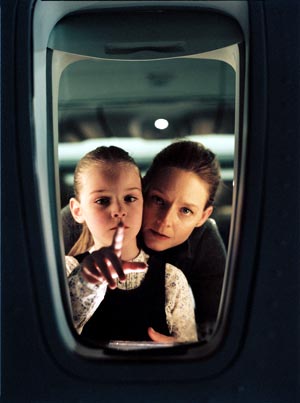 I was just beginning to believe that I had overcome my Miami airport jinx when I realised that I was the only person left waiting next to the reclaim carousel on Sunday. My suitcase was to enjoy an extra three days sojourn in Florida. Still no burning engines and tearful stewardesses this time round...just a few disconcerting sparks from the undercarriage as we lifted off. And the best part was that storm fronts around the Gulf had delayed my flight out of Guatemala enough that I missed my AA connection and had to be shifted over to BA − free bar, friendly personnel, edible food and some actual entertainment.
I was just beginning to believe that I had overcome my Miami airport jinx when I realised that I was the only person left waiting next to the reclaim carousel on Sunday. My suitcase was to enjoy an extra three days sojourn in Florida. Still no burning engines and tearful stewardesses this time round...just a few disconcerting sparks from the undercarriage as we lifted off. And the best part was that storm fronts around the Gulf had delayed my flight out of Guatemala enough that I missed my AA connection and had to be shifted over to BA − free bar, friendly personnel, edible food and some actual entertainment.Some genteel American retirees stood and moaned for some time after boarding about the cramped conditions in coach on the BA jumbo. "There should be a law against this...It's back to Delta next year." Yet I don't think you are any more of a battery chicken on this aircraft, it's just that the 747 is that much wider than the 777 that the main US carriers tend to fly. I have no recent experience of Delta, but nothing can be as bad as American. They didn't even serve us a meal on the 185 minute flight to Guatemala.
From an end-user perspective flying hasn't changed much since I was a boy, except that Concorde came and went. Yet Robert Schwentke's Flightplan anticipates the recognisably new era of commercial air-travel that now appears to be dawning. Plane or plot is the chicken and egg question here. Was a special futuristic aircraft needed to service the conceit of a mile-high missing person, or did the Aalton E-474 emerge new from its hangar in need of a convoluted thriller storyline to justify its cinematic existence?
This movie is Panic Room meets Aiport meets The Lady Vanishes. Gripping, good performances, some eye-catching art-house camerawork and mis-en-scene, and generally very silly. (V would have guessed who was behind the whole thing from the moment they sat in their seat and would have complained through the rest of the movie!)
In his Guardian review Peter Bradshaw wrote that "one day Hollywood will stop skirting around 9/11 and tackle it head-on." Well, now they have, and I reported that in United 93 the most chilling part of the experience was actually feeling that you were on the plane. Schwentke invested a lot in his set, but it never really convinces as a plane in flight. The build and the textures are right, but the mood isn't. The sudden, noisy little judders of turbulence roughly every 15 minutes simply served to draw my attention to this inauthenticity. (Also, how many westbound red-eye flights are there and would it still be dark when you arrived? Why would a Germany-USA flight have a Japanese language airline video?)
Not sure that Flightplan flies circles around 9-11, but it certainly plays the Ahmed card quite shamelessly.
Finding out what is actually going on is not the moment of clarity you would expect!
I haven't seen much of Greta Scacchi since she turned down the Sharon Stone role in Basic Instinct back in 1992. One of the scariest parts of this movie is how much both she and Jodie Foster have aged. I used to have a bit of a crush on Greta when she appeared in The Coca Cola Kid and Defence of the Realm.
The Fox and the Hedgeherg
Fearless
 Another brutiful Chinese wushu epic, though there's more brute than beaut in this ideologically-laden bash-fest.
Another brutiful Chinese wushu epic, though there's more brute than beaut in this ideologically-laden bash-fest."From the people who brought you Hero..." trailed the trailer. But it's not from director Zhang Zimou, rather the more anonymous collective that brought us the highly suspect "one nation" ideology behind Hero, and much of China's output in this genre.
Still, it's vaguely interesting to see Westerners represented with the kind of xenophobic disdain with which we have ourselves treated foreign cultures over the years. (Does O'Brien really represent what the Chinese think of the Americans?)
Li plays Huo Yuanjia, founder of the Chin Woo Sports Federation, "now with branches in over 50 countries around the world" we are told at the end, a piece of information I experienced with a little shudder of western insecurity. This version of his biography has been highly fictionalised, but Yuanjia did die after taking on 10 members of the Japanese judo team and then accepting his opponents' medicine for his tuberculosis.
Rather like Ben Hur, Yuanjia's individual heroics in this story ultimately serve to demonstrate the insignificance of selfish individualism. And other than an ability to defeat all-comers in face-to-face combat, he is noticeably lacking in appealing qualities. Yet the film is often exhilarating, even if no match in terms of visual elegance for Zhang Zimou's martial arts output.
Jet Li says this will be his final martial arts epic, but he will continue to work in other genres (one suspects more likely to be those involving a mounting body count than romantic comedy).
Retributive Violence
 I suppose you have to be French to be both very sorry and ne regret rien.
I suppose you have to be French to be both very sorry and ne regret rien.Zidane's response reflects a fault-line in our culture I first became painfully aware of when, many years ago, I went to see Harrison Ford in Witness with a Swiss girl I was very smitten with at the time.
There's a scene where some rednecks start baiting a carriage-load of Amesh, including bogus bible-basher John Book, Ford's character. It is their normal practice to turn the other cheek to such provocation, but not for the red-blooded mainstream American male. Book swings a punch and a redneck hits the dirt with a broken nose. Some of the audience in the cinema duly applauded. Not my Swiss friend though. She fumed.
I can't recall having vocally supported Book's manly approach to wind-up merchants, but somehow this on-screen incident soured the mood of the evening, opening up an un-spoken rift between me and the embodiment of patient neutrality at my side!
Wednesday, July 12, 2006
Only to be expected
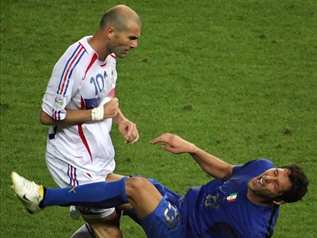 It seems that it's OK to head-butt narcisistic Italians in shiny outfits provided that you are a member of an oppressed race and the designated target has made the kind of witty remark about your other half that nationals of this lanky country are justly famous for. Abbas Raza writes:
It seems that it's OK to head-butt narcisistic Italians in shiny outfits provided that you are a member of an oppressed race and the designated target has made the kind of witty remark about your other half that nationals of this lanky country are justly famous for. Abbas Raza writes:"As Western nations continue to dominate and oppress the third world by economic as well as military means and the cynical manipulation of governments, as they continue to wreak havoc on the environment, as the injustices of extreme inequality in the distributions of wealth continue to grow, it is to be expected that some will be driven to irrational anger, and will break the rules. And hit back. You can't just show everyone a red card. "
However, Marco Materazzi denies being an oppressor. He is, he insists, only a poor uncultured wop who worships his mamma and has no idea at all what an Islamic terrorist is.
Nevertheless across the Channel at least, the suspicion remains that ZZ was in some way standing up for the world's downtrodden (and Gallic masculine pride in general), as opposed to our own Wayne Rooney whose less emblematic downtreading merely involved standing up on a Portuguese man's testicles.
Tuesday, July 11, 2006
Mariachi
 Another memorable shooting occurred in Guatemala City's Zona 11 on Wednesday June 28. A man produced an AK-47 out of a guitar case and emptied it into a stationary microbus, killing one and wounding two others, before escaping the scene on a motorbike. One of the two men hospitalised was the driver, the other was a regular rush-hour acquaintance of the dead man, though apparently had no idea what his late companion's line of work was.
Another memorable shooting occurred in Guatemala City's Zona 11 on Wednesday June 28. A man produced an AK-47 out of a guitar case and emptied it into a stationary microbus, killing one and wounding two others, before escaping the scene on a motorbike. One of the two men hospitalised was the driver, the other was a regular rush-hour acquaintance of the dead man, though apparently had no idea what his late companion's line of work was.
Monday, July 10, 2006
Riddled
 Personal firearms are routinely carried quite openly in Guatemala, as this pic taken from our bedroom window attests.
Personal firearms are routinely carried quite openly in Guatemala, as this pic taken from our bedroom window attests.When I first went to Central America in the late 80s my parents appeared convinced that I would be riddled with bullets before making it through Customs. Yet although I was probably exposed to far more danger than I realised at the time in El Salvador, Guatemala itself was comparatively safe for transients back then.
These days you have to be alert to people 'packing under the influence', especially on weekend nights. On our first Saturday we were about to board an Orellana bus home, when on a whim we decided to let it pass so we could try out a shuco from La Perrada ( as recommended by Blog de mi Guatemala.)
The next bus was one of the more chickenish kind that terminates in San Antonio. As we got down at our corner we spotted the now stricken Orellana a little further up the road behind a police cordon. All around the grassy verges were filling up with noveleros and the first verbal reports were being passed from neighbour to neighbour: a shoot-out; two dead.
Forensics from the Ministerio Público was already at the scene taking photographs on the bus. From the rear hatch, blood was seeping down onto the tarmac which had been illuminated by a powerful lamp the MP team had brought with them. After a while the Bomberos clambered up using the red and sticky metal step at the back and brought down the two corpses. They were laid out face upwards, oddly depressed below the diaphram. Both were wearing dirty non-descript jeans and t-shirts. "Mecánicos" someone explained. One had been shot six times. The hair of the other had a dense coating of dark, syrupy blood.
At the edges of this theatrically-lit crime scene a crowd was gathering, including mothers carrying curious youngsters. The star of the show, la Fiscal, strutted around the stage in high heels, waving her clipboard and directing her subordinates to cut away the clothes of the deceased and take their fingerprints. On their exposed ribcages and around the road where other bits of evidence were deposited they also positioned little plastic yellow signs: "A", "B" etc.
Were these young men victims or perpetrators? We never found out for sure. A few days later we heard it said that both had indulged in some binge-drinking at a fiesta in Alotenango and that the man that had started shooting was himself one of the two muertos stretched out on the road. If we had boarded that bus we would almost certainly have had to squeeze down the aisle to find a seat right at the back where the firefight broke out.
The MP team gathered to compare notes then departed in a marked SUV. The bomberos then tipped the corpses onto stretchers and loaded them onto their open-backed 'ambulance'. The fireman holding onto the rear of this vehicle between the feet of the two stiffs had time to pass a joke with one of the onlookers before they drove off back to Antigua.
A day later it was reported that a female Fiscal of the MP had been killed after driving into the back of a large trailer. Was it the same one? Had she also been subjected to the same ignoble post-mortal humiliation by her living colleagues, laid out and stripped, tagged and carted off, painted toes sticking out the back of a pick-up?
Another gun-toter of note in our area is an affable Man from del Monte type on an old bicycle who follows a single horse and rider around the neighbourhood several mornings of each week. An equestrian trainer with fair skin and a neat little grey moustache, he wears a square-cut Panama and a pair of calf-length patterned leather cowboy boots, the right one unzipped half-way to reveal the butt of a sizeable automatic handgun. He also sports one of those patrician smiles that succinctly communicates the message to any vagrant low-lifes: "Muy buenos dias, come any closer baboso and I'll empty my pistol into your thorax."
Mundial (5): Honkety Honk
 Not in my view a victory worthy of a night of hooting cavalcades...but then I'm not Italian.
Not in my view a victory worthy of a night of hooting cavalcades...but then I'm not Italian.Zizou certainly made sure we'd all remember his final appearance for les bleus. And amazingly, "Zid Vicious" has today been awarded the Golden Ball for best player of the tournament. (Voting took place at half time.)
And so it ends for another four years. I saw most of the second stage out in Guatemala where they describe this 64 partido glut as los festejos, treating it essentially a month-long public festival. Hardly any of the TV ads failed to reference the Mundial and most showed off a sense of humour that British advertising has sadly lost over the last decade or so.
Perhaps in part because of the pan-Latin anti-European sentiment I could sense out in Central America, I've even found myself letting off cuetes for the French and the Germans as they saw off the Argies and then the Brazilians, teams that seemed to think they only had each other to worry about.
At least we're not as bad at penalties as the Swiss!
The commentators on Guatemala's channels 3 and 7 may have sat behind desks in drab 80's-style studios and struggled with surnames like Sweinsteiger and Hargreaves (shvenstegger/hairgrafe) but otherwise delighted with their uplifting lexicon of zapatazos, pelotazos, sombreritos, (rrr)remates and contra-remates. I have reproduced a few of their more accomplished verbal passes below:
Tirar la pelota para bajar cocos: a shot designed to bring down coconuts - Lampard, Maniche etc.
Irse a la piscina verde: to plunge into the green pool i.e. take a dive - C. Ronaldo, Henry etc.
Son como divorciados, nunca se buscan, nunca se acercan: they're like a divorced couple, they never look for each other or get close to each other - of Aimar and Riquelme.
